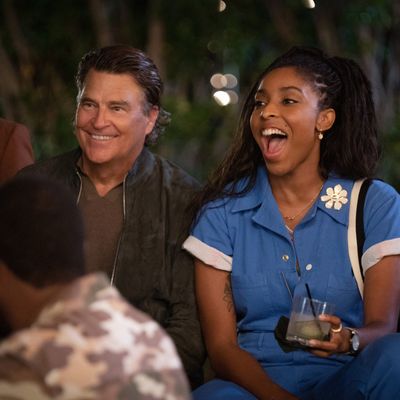
What kind of series is Shrinking? The title implies some type of sitcom about therapists, and the first few episodes often bore that out, dipping into both the personal and professional lives of these three therapists in Pasadena. The pilot in particular was structured around Jimmy’s choice to change up his way of doing therapy by being brutally honest with his patients. That’s the premise featured prominently in basic descriptions on sites like IMDb or even this one.
But as I’ve discussed in these recaps, the show has gradually drifted away from the therapy practice over the course of this first season, to the point that those initial synopses don’t really fit anymore. That’s not a bad thing; the high-concept hook of Shrinking was always a shaky one, and the longer the show focused on the ethical breaches of Jimmy’s outrageous therapizing, the more difficult it would become to justify his continued employment. It was smart to move away from focusing solely on Jimmy, and by and large, the show has transitioned to a comfy hangout sitcom pretty successfully. While these ten episodes may have rushed a bit to get there — forcing various unlikely pairings into shared story lines to justify these people spending so much time together — it has resulted in an ensemble likable enough to follow for multiple seasons.
The pivot away from Jimmy’s role as a “psychological vigilante” makes sense for the show, especially when early episodes drew a direct connection between his unaddressed grief and his over-investment in his patients’ lives. But what’s odd is that Jimmy has kept going with his new methodology throughout this season, even as his own mental health has improved drastically. The writers have shown that they understand the issues with Jimmy’s radical ideas, particularly with Sean’s violent explosion at the end of the pilot and the various disasters in the fourth episode. But since then, the show has just featured less therapy, and thus Jimmy’s irresponsibility has been effectively swept under the rug. In “Closure,” Paul says he’s surprised Jimmy didn’t burn the whole practice down considering “all that crazy shit he did with patients,” and that’s the first acknowledgment of the subject in weeks.
Of course, the very last scene of this finale delivers a dose of much-delayed consequences: Following through with her earlier fantasy of pushing her emotionally abusive husband off a cliff, Grace reacts to an insult and threat from Donnie by boop-ing him to his death. The episode sort of frames this as an escalation indirectly encouraged by Jimmy; in the one actual therapy scene (only a minute of screen time), Grace thanks him for helping her see how strong she is, and Jimmy goes so far as to hype up her fantasy: “That’s what I’m talking about! Off the cliff! Bash them brains! Eat them up!” When she finally snaps, it feels similar to Sean’s blow-up: a “shit just got real” moment that shows the consequences of moving at your therapist’s pace instead of your own.
Still, it’s an odd tonal fit for the episode, disrupting a pretty perfect emotional conclusion to the season. It just feels out of place, and it’s unclear what it promises for the series going forward, especially when recent episodes have mostly ignored Jimmy’s patients.
If you forget about that final stinger — if you drop the therapy theme in general — this is a very solid, satisfying finale that sets up the next season nicely. For Shrinking to last multiple seasons, it will need a reason to keep all its characters in the same room, and Sean and Liz’s new partnership in catering provides that. Liz may be the one investing thousands of dollars into Sean’s idea, but it’s really nice to see him in the power position; she has to shyly ask him to include her in more decisions, and when he does, her surprised gratification almost makes her cry. (“Are you sad because he was so kind to you?” Derek asks sympathetically.)
Liz is in rare form this episode, barreling into Paul’s office to give him shit for refusing to write a recommendation letter himself for Gaby. With Paul’s big gesture in the last episode, his arc for the season is basically complete, so this story is about him more broadly addressing his failure to appreciate the women in his life. In the end, of course, he comes through, interrupting Gaby’s interview with snooty Gerald to call her the most empathetic clinician he knows.
The main narrative tension going into this finale came from the question of whether Jimmy would be able to deliver a wedding speech without falling apart, but that’s not so much a concern here; there’s one moment when he panics, but he’s up and ready to go moments later. The main focus is on Jimmy and Alice’s parallel experiences of grief. In keeping with Shrinking’s interest in exploring the messiness and complexity of the grieving process, they aren’t completely synched up in the opening moments of this episode. As Jimmy patiently explains to Alice, he’s ready to move forward after feeling stuck for over a year. But from Alice’s point of view, the casualness with which her dad boxes up Tia’s clothes and photo albums feels like a betrayal. Why should he get to move on when she can’t stop dwelling on the past?
And yet maybe the single scariest idea for Alice is that she could move on, that she could get swept up in life and allow her mom to drift from her memory until it’s like she was never there to begin with. There’s no chance of that happening, of course. But when a parent dies, you’re not just losing them in that one moment; you’re still losing them years later, with each memory feeling a little more distant every day. There’s something unbearably sad about that, and it’s important to have someone like Jimmy there to remind you that you didn’t do anything wrong: “You loved your mom so much, and she knew that.” It’s that last phrase that gets me: She knew that.
It’s really moving to see Alice grieving the same way Jimmy already has, sitting in the dark kitchen while she thinks endlessly about the moments with Tia she desperately wishes she had more of. But like Jimmy in recent months, Alice has put in the work, and she’s at a place where sharing funny stories with Sean is comfort enough. When she dons Tia’s “hot-as-shit shoes” for Brian’s wedding, it’s a subtle way of staying connected to her mom, and understanding that her Tia will always be there with her, even if she’ll still miss her half a century from now.
You could argue that the wedding festivities themselves are super-rushed, confined entirely to the last ten minutes, and you wouldn’t be wrong; Brian himself gets lost a bit here, and it’s supposed to be his big day. But Jimmy’s speech makes for a very fitting capper to the season, even if the message is predictable. “My wife believed that the best way to help yourself was to help others,” he says, a reminder of one of the core reasons these three therapists do what they do.
As everyone dances to Bowie’s “Modern Love,” the final big music budget flex of the season, we experience a moment that I wish was the actual ending of this finale: Jimmy telling Alice, “You look so much like your mom.” It’s a direct callback to what he told her at the end of the first episode, but now it has a totally different context. Back then, Jimmy said it sadly; Alice’s resemblance to Tia was almost a bad thing, because it made it difficult for him to face his daughter without getting trapped in a grief spiral. Now? He still sees Tia every time he looks at Alice, but he appreciates that for what it is. What a sorrow it is to lose someone, but what a gift to remember them.
Progress Notes
• As I alluded to, the only character who really gets shortchanged in this finale is Brian. I really would’ve liked to see a scene of his dad coming around and agreeing to be his best man, but that happens off screen after his confrontation with Jimmy, which feels strange to me. Additionally, I’d like to get a better sense of who Charlie is next season, since he’s mostly just blandly likable at this point.
• Brian does know Derek’s name now, though, which is a nice touch.
• Jimmy’s speech (and Liz’s taunting) makes Gaby realize he isn’t just “safe dick,” so I expect next season to feature more of their romance (and the feelings it triggers in Alice). I can’t say I’m super into the idea yet, but let’s wait and see.
• Gaby telling Liz, “You’re cool. Deal with it” is a nice moment of growth. Early in the season, Liz resented Gaby’s perception of her as just a mom, and had to argue for her own coolness. Now Gaby is the reminder she needs when she forgets she is cool.
• Harrison Ford’s line reading of the episode probably has to be “What kind of a person hugs and tells?” But I might be even more fond of his initial, grave, “You told her about our hug.”


